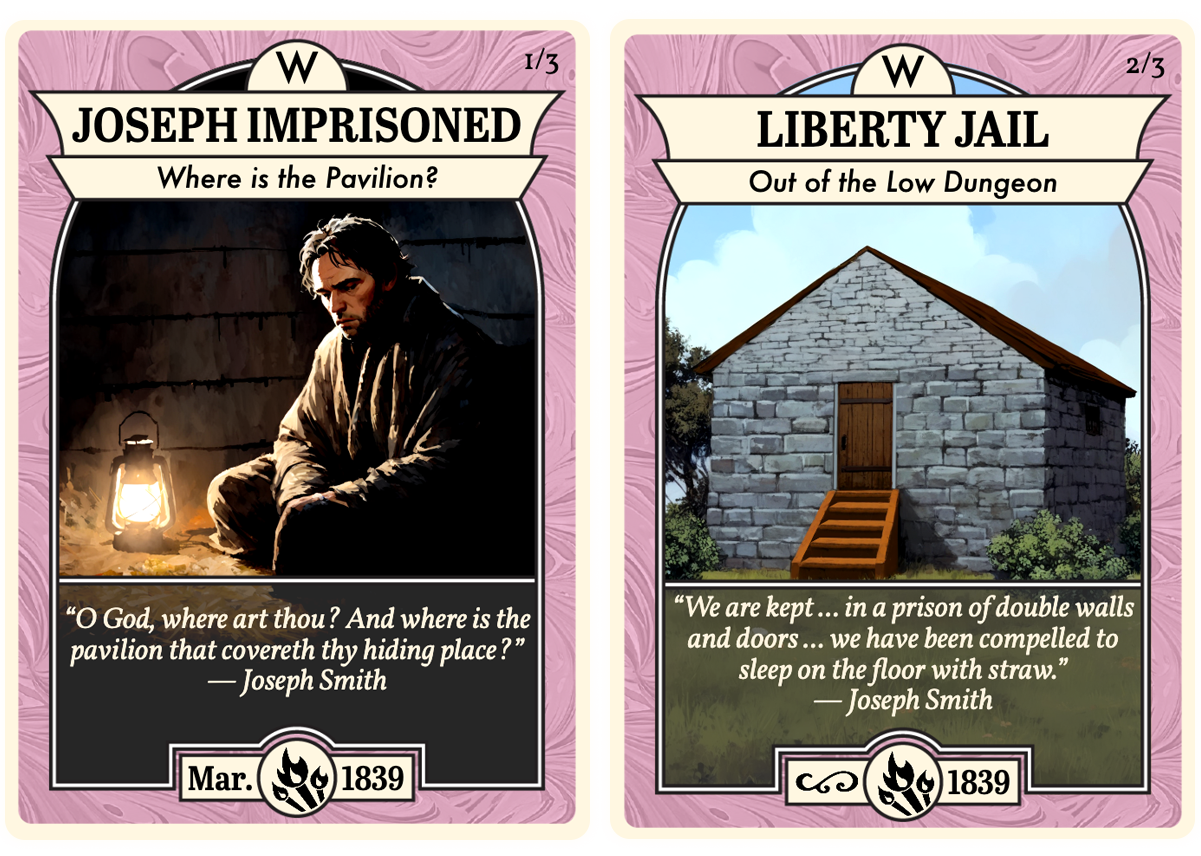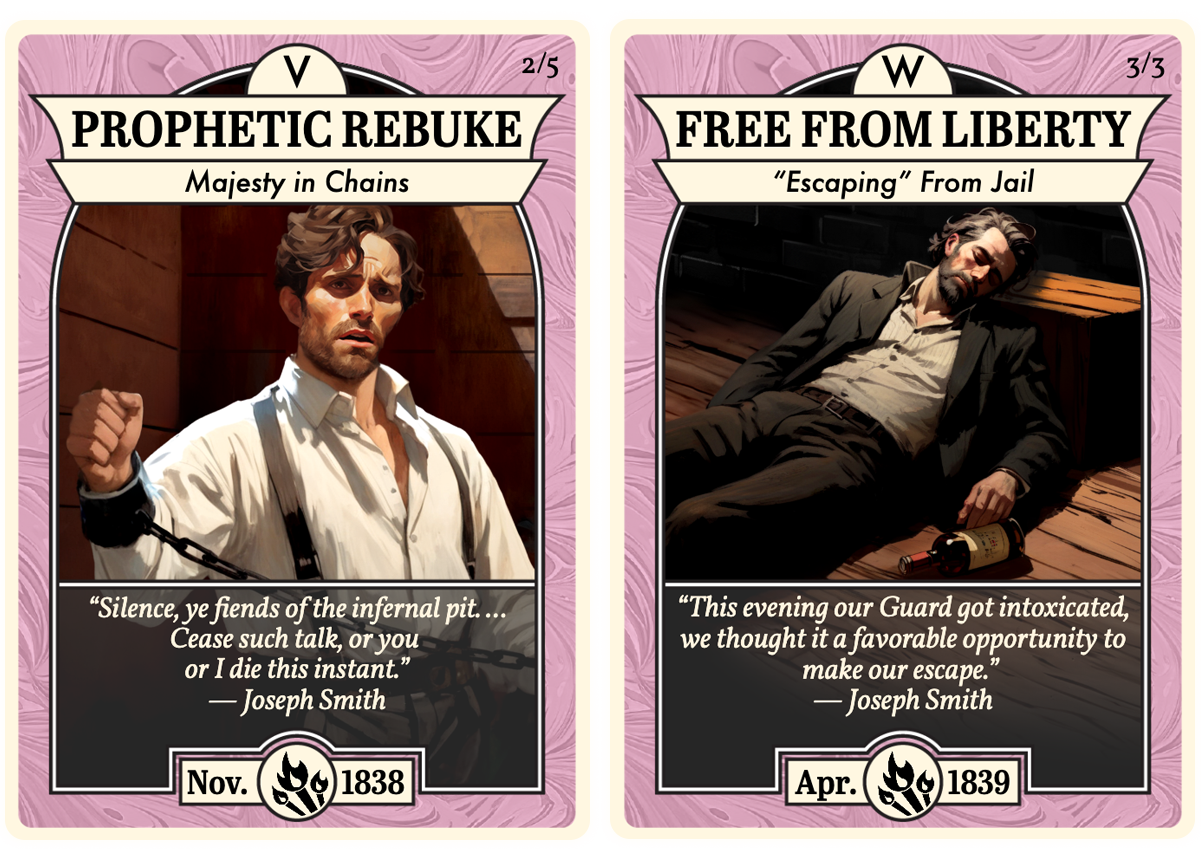When people think of Liberty Jail, they often imagine it as a place of despair. And in many ways, it was. In the fall of 1838, tensions between the Saints and their Missouri neighbors erupted into what became known as the “Mormon War.” Accusations of treason, violence, and conspiracy led state officials to order the arrest of Joseph Smith and other Church leaders. After being betrayed and taken prisoner, they were confined in the small stone jail at Liberty, Missouri, to await trial through the bitter winter months. There, Joseph and his companions suffered cold, hunger, and the uncertainty of their future.
Yet this prison also became a temple—a place where revelations came, faith and resolve were strengthened, and God’s mercy was seen in unlikely ways. The story of Liberty Jail is one of suffering turned to sanctification, making it one of the defining experiences of the early Church.
“O God, Where Art Thou?”: Joseph Imprisoned and Liberty Jail

In December 1838, Joseph Smith and other Church leaders were marched in shackles to the ironically-named Liberty Jail, a small stone fortress built to confine even the most determined escapees. The dungeon-like lower level was dark, smoky, and freezing, with straw on the floor for beds and only two narrow windows for air. “We are kept under a strong guard, night and day, in a prison of double walls and doors,” Joseph wrote, also describing scant food and lack of blankets in winter.
Yet in the midst of this misery came some of Joseph Smith’s most profound revelations. From Liberty Jail, he dictated letters that both comforted the Saints and counseled Church leaders scattered across Missouri and Illinois. These words were not only timely but eternal. His cry, “O God, where art Thou? And where is the pavilion that covereth Thy hiding place?” gave voice to the despair of a prophet and a people who felt abandoned. The Lord’s reply assured them that “thine adversity and thine afflictions shall be but a small moment,” and that those who pressed forward in faith would be exalted on high (D&C 121:1, 7).
These same letters also taught that the power of the priesthood is inseparably connected with righteousness, that persecution refines the Saints like fire, and that bearing affliction with patience and charity allows God’s power to flow more fully into the lives of His children. The doctrines in Doctrine and Covenants 121–123 continue to showing how even in a dungeon, revelation could turn a prison into a temple.
Betrayers and Defenders: George M. Hinkle and Alexander Doniphan
![Two illustrated Church History Cards. The first card, titled George M. Hinkle: Traitor, Coward, and Thief, shows a stern man in a tall black top hat, dark beard, and brown coat over a black vest. Behind him is a stormy red sky. The quote beneath reads, “Hinkle proved one of the worst of traitors that ever occupied a standing on earth.” —Wilford Woodruff. The date shown is 1838. The second card, titled Alexander Doniphan: A Friend in the Militia, shows a serious young man with tousled light-brown hair, wearing a tan coat, white shirt, and blue cravat. The quote beneath reads, “I was condemned by court-martial to be shot … Gen. [Doniphan] said it was cold-blooded murder [and] would have nothing to do with it.” —Joseph Smith. The date shown is 1838.](/cdn-cgi/image/f=auto,fit=scale-down,w=3840,h=856/files/xLVQxj/img-ad5571a6-4fad-4ead-9261-736dfecd275a.png?t=eyJhbGciOiJkaXIiLCJlbmMiOiJBMjU2R0NNIn0..X80JQLImNc3TGSeI.lKoVSWGRzFn6VQxvys051d6qUOXvg5Q7rt5IOkktLpabQGjzxZ-vE3ZpJLuwmRYHm99Sva8r649rhRwDdKInjk9R6liQJ8ObO4TeOGeokpUKYQAwAw8WaTepPcrR7xlmvqytQgXBl4oVUh8BYlUFHigeqLGI9lDmRn7gaR1rM0KnHNwvrQs4bKR513v1ooCrXXtz-cdsOdjYUDBECfDPONIOjCBPzKjV2AYH9ssZAfsISCqOEiPns3ZFOowwbFxw2aYggOtmly28HdS0jeasSORUrNBR5TU0kfGD3s4U6O70CP7cypJ6l-TjgmgRtgZcjzR7afZNNCkjfPikFFKbvk6FO0pMDXKbc73arqMwOHSQGVLaaGyaZV1F0xgdeO1XbhDm1w7bX_oWXEobH2oZlypxf1Q.GFsWQrT9poXKuczmFV7UdA)
The imprisonment of Joseph Smith was not only the result of outside enemies but also of betrayal from within. George M. Hinkle, a colonel in the Missouri state militia and once a trusted Church member, played a pivotal role in the Saints’ downfall in 1838. When Far West was surrounded, he pretended to negotiate on behalf of the Saints but instead surrendered Joseph Smith and other leaders into the hands of hostile militia officers. His treachery did not stop there—he evicted Emma Smith from her home during the chaos and, after being excommunicated, went on to start his own church. Wilford Woodruff would later brand him “one of the worst of traitors that ever occupied a standing on earth.”
Yet where betrayal brought Joseph into chains, unexpected loyalty preserved his life. Alexander Doniphan, a lawyer and brigadier general in the Missouri militia, had advised and even defended the Saints in earlier disputes. By late 1838, however, he found himself serving under General Samuel Lucas, who ordered the immediate execution of Joseph and his companions by firing squad. Doniphan’s response was firm and fearless. Calling the command “cold-blooded murder,” he refused to carry it out and threatened to hold Lucas personally responsible if it proceeded. His moral courage forced Lucas to back down, sparing Joseph and the other prisoners.
The contrast between Hinkle and Doniphan could not have been starker: one a traitor who sought to destroy Joseph, the other an officer who, at great personal risk, defended him. Joseph later honored Doniphan by naming one of his sons after him.
Silence, Fiends — and Freedom: Prophetic Rebuke and Free from Liberty

The months of imprisonment were filled not only with cold and hunger but also with the cruelty of guards who mocked and abused the prisoners. At Richmond, Missouri, before Joseph was sent to Liberty Jail, the guards spent one night boasting of the murders and assaults they had committed against the Saints. Their vile words echoed through the dungeon until Joseph could bear it no longer. Rising to his feet, he thundered, “Silence, ye fiends of the infernal pit. In the name of Jesus Christ, I rebuke you, and command you to be still!” The guards instantly fell quiet. Some apologized; others shrank back in fear, crouching against the walls. Parley P. Pratt, one of Joseph’s fellow prisoners, never forgot that moment. He later testified that he had seen kings, parliaments, and courts of law, but true dignity and majesty he had only seen once—as Joseph Smith stood chained in a Missouri dungeon, commanding evil men to silence.
That same spiritual authority that rebuked the guards also sustained Joseph through the long winter in Liberty. And when the time came, God opened the way for deliverance. By April 1839, public opinion in Missouri was beginning to turn against the extermination order. While Joseph and his companions were being transferred for another trial, the guards proved unusually lenient. One sheriff even hinted that he would look the other way if they chose to escape. One evening, after the prisoners bought whiskey for their guards, most of them became intoxicated. Joseph later recorded, “This evening our guard got intoxicated, we thought it a favorable opportunity to make our escape; knowing that the only object of our enemies was our destruction.” With the help of a sober guard, Joseph and his companions quietly slipped away, saddled horses, and rode east through the night, avoiding main roads to keep from being captured.
After months of darkness and uncertainty, Joseph finally reunited with his family and the Saints in Illinois on April 22, 1839. His escape did not erase the suffering he had endured, but it marked the end of a season in which a dungeon had become a place of revelation, where the voice of a prophet rose above chains, cruelty, and despair.
Learn more (and get your own set of cards) at churchhistorycards.com.
Bonus Trivia
*Answers in footnotes
1. Which of the following was NOT included in the charges that led to Joseph‘s imprisonment in Liberty Jail?[1]
A. Murder B. Arson C. Adultery D. Treason
2. Aside from his role in the Missouri militia, what was Alexander Doniphan’s profession?[2]
A. Constable B. Carpenter C. Lawyer D. Farmer
3. Where did Joseph and his friends go after escaping from the guards?[3]
A. North toward Kansas B. South toward Independence C. Northeast toward Far West D. East toward Quincy, Illinois


